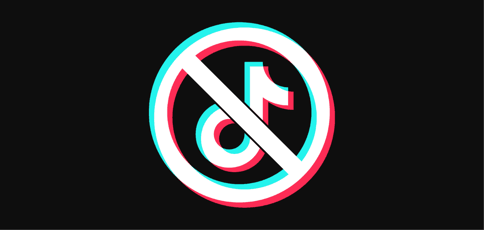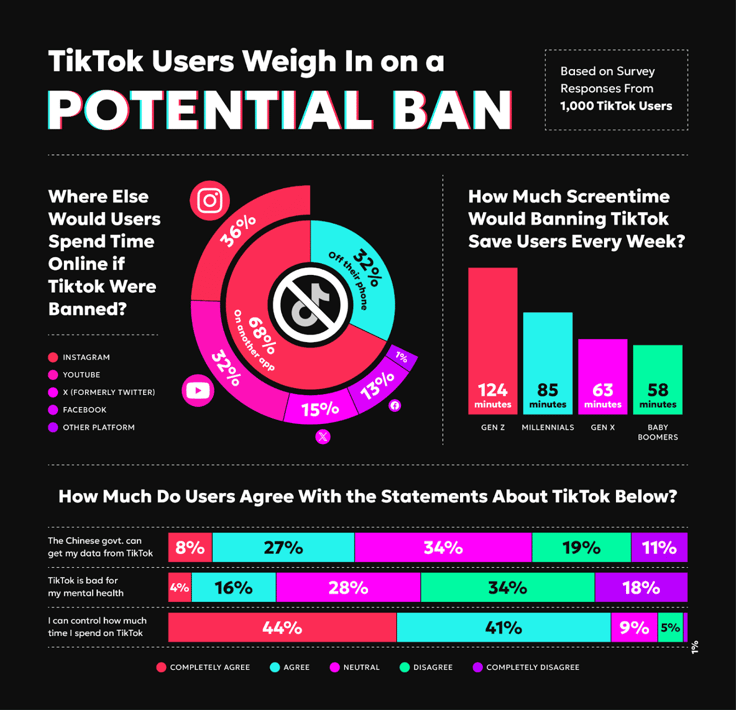
TikTok’s future in the U.S. hangs in the balance as debates over a potential ban intensify. With the legislation that could ban it now being law, the possibility of TikTok going away is looking more and more likely but not without plenty of challenges in court from the social media platform.
While the U.S. government’s position is evident, we want to better understand public sentiment on the issue. We surveyed over 3,000 people to determine whether they support or oppose a TikTok ban and gained insight into how users of the app feel about the possibility of it no longer being available.
Our survey reveals some significant regional differences in support and opposition to a ban and dives into the unique perspectives of TikTok users to find out how their daily lives may change if TikTok were banned for good.
-
Navigate This Article:
Does Your State Support or Oppose a TikTok Ban?
To get a look at how regionality plays into the support or opposition of a potential banning of TikTok, we surveyed people from every state and simply asked them if they would support, feel neutral about, or oppose TikTok being banned.
Nationally, 51% of respondents oppose a TikTok ban, 32% support it, and 17% feel neutral about the topic. Those numbers fluctuate a fair bit depending on where you call home.
The States That Most Support a TikTok Ban
- Rhode Island: 43.5% support, 41.3% oppose
- Connecticut: 43.1% support, 41.2% oppose
- Maryland: 42.6% support, 38.3% oppose
- Missouri: 42.3% support, 38.5% oppose
- Washington: 38.9% support, 50% oppose
All of the states where support for a TikTok ban is strongest have fairly consistent levels of opposition (around 38-42%), as well.
The only outlier here is that 50% of those in Washington oppose the idea of a TikTok ban, showing us that residents are more opinionated on the matter and less likely to be neutral about it.
It’s worth noting that one other state — Oregon — had stronger support (38.9%) than opposition (37.0%) when asked about a TikTok ban.
The States That Most Oppose a TikTok Ban
- Mississippi: 75.5% oppose, 10.2% support
- Florida: 66.7% oppose, 25.5% support
- Texas: 66.1% oppose, 25.4% support
- Louisiana: 64.2% oppose, 15.1% support
- Georgia: 62.5% oppose, 25% support
The American South has strong representation among the states that most oppose a TikTok ban, with six of the top seven states calling that region home.
However, there doesn’t seem to be much room for a middle ground in several of these states, as Florida and Texas both have two of the fewest neutral percentages of any state we surveyed.
Although a TikTok ban is viewed as a bipartisan issue, states tend to follow party lines on the topic, based on our survey results. Almost all of those that most support a ban are historically blue states, while those that oppose it are traditionally red states.
While only five states have stronger support numbers than opposition numbers when asked about a TikTok ban, thoughts on the issue vary a fair bit depending on where you live.
How Do TikTok Users Feel About a Potential Ban?
After analyzing the regional disparity of the general public’s views regarding a TikTok ban, we wanted to get a little closer to the issue and hear from the people a ban could impact: its users.

We surveyed 1,000 TikTok users of varying demographic groups and usage rates to see how a ban on the social site would affect their day-to-day lives.
Specifically, we wanted to know how much time they’d get back in their day not being able to scroll through TikTok, how TikTok impacts their mental health, how they’ll spend their time if the app is no longer available, and what they think about common TikTok talking points in the media.
TikTok Usage
- The average Gen Z TikTok user would gain over 2 hours back in their day if TikTok were banned. Millennial users would reclaim about 85 minutes, and Gen X users just over an hour.
- 30% of TikTok users say they fall asleep watching it. For heavy users, that number jumps to 51%, while for light users, it drops to about 16%.
How They’d Use Their Time Back
- If TikTok were banned, nearly one-third of TikTok users (32%) believe they would spend more time off their phones.
- The social media platforms most TikTok users think they’d use more are Instagram (36%), YouTube (32%), and Facebook (15%).
- 53% of TikTok users have used Instagram Reels, 43% have used YouTube Shorts, and only 8% have used Snapchat Spotlight.
- 39% of TikTok users think a ban would have no impact on them at all. However, 1 in 10 (10%) think it would have a positive impact.
Thoughts on Common TikTok Talking Points
- 36% of TikTok users believe the Chinese government can access their data through TikTok. This view is held by 46% of Republicans and 34% of Democrats.
- One-fifth of TikTok users (21%) think TikTok is bad for their mental health. Men (26%) are slightly more likely to agree than women (18%).
- Over 1 in 10 Gen Z TikTok users (13%) disagree with the statement: “I have control over how much I use TikTok. I could quit tomorrow if I wanted to.”
“There’s a stark difference in how the U.S. government and U.S. TikTok users view the platform’s threat to Americans. On one hand, only 34% of Democratic lawmakers believe China can access user data, but liberal states support the ban the most. Republican lawmakers, however, have a stronger belief (46%) that the Chinese government is a TikTok security and privacy threat — yet users in conservative states oppose the ban overwhelmingly,” said HostingAdvice technology expert, Joe Warnimont.
“Perhaps some TikTok users see freedom of choice as more important than averting China’s gaze, while others might rebuke further governmental regulations. Based on how a significant portion of TikTok users don’t seem to think the platform is bad for mental health — and that they can quit at any time — I’d argue there’s also denial involved with many user responses.”
Closing Thoughts
The debate over a potential TikTok ban reveals significant regional differences in support and opposition across the U.S., with some states showing stronger support numbers for a ban than others. Even among TikTok users, opinions vary widely about the app’s lasting impact and the potential consequences of a ban.
Our survey highlights these diverse perspectives, showing how everyone’s relationship with the social platform is unique. From reclaiming hours in the day to concerns over data privacy, the potential ban stirs a mix of responses.
At HostingAdvice, we strive to provide the latest insights and guidance on tech trends and digital behavior. Understanding these patterns helps us better inform and support our readers in navigating the evolving tech landscape.
Methodology
To find out more about how Americans feel regarding a potential TikTok ban, we surveyed more than 3,200 people over a two-week period in May 2024.
First, we surveyed a random sample of residents from every state to see how much they support or oppose a TikTok ban. We then asked 1,000 TikTok users questions about how often they use the app and how it would impact them if it were banned.



